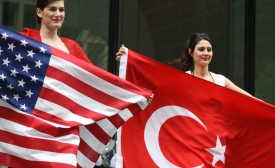russia
Last June, U.N. Secretary-General Ban Ki-moon issued a far-reaching administrative ruling that offered marital benefits for the first time to all of the United Nations’ lesbian and gay employees, as well as to other U.N. workers who had entered legally recognized domestic partnerships. On Monday, March 2, Russia gave the plan a resounding nyet.
The results of yesterday's parliamentary election in Estonia would not be of interest to anyone outside the tiny nation, were they not a test of Russian President Vladimir Putin's soft power in the post-Soviet Baltic states.
The rising tensions between Russia and the West, especially the United States, over Ukraine provide a constant reminder of the Cold War, when the two superpowers fought proxy conflicts for spheres of influence. A key question in the current game of great power politics is whether China and Russia will form an alliance against the United States?
Last week, a report from a committee of the House of Lords offered a brutal judgement on British and European policy toward Russia. Europe went “sleep-walking” into the crisis in Ukraine, said the report, and Western countries had lost the “robust analytical capability” to understand Russia. The truth about UK policy toward Russia, however, is much worse.
Europe will be "in deep trouble" if it continues to rely only on soft power, given the threats it now faces from the east and south, according to the Belgian commander of the five-nation Eurocorps headquarters.
The Open World program works to link members of Congress to Eurasian leaders and is an instrument for Americans engaged in citizen diplomacy.
Obviously, Putin fears European soft power, since it is a force to which he has no response. Russia’s lack of attraction is one of its most serious weak spots. Its leverage rests on its state-controlled extracting industries and its military.

The intersection of public diplomacy, people-to-people communication and international trust building is explored in this new article by Kirsten Mogensen, an associate professor at Roskilde University in Denmark and an alumna of the CPD Summer Institute.







